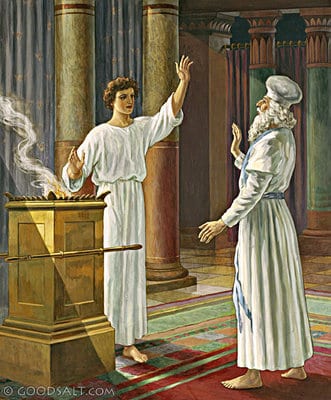
“Mindy” waits tables in a local “breakfast stop.” She works energetically, smiles at customers, and helps create a pleasant environment for those she serves. Mindy supports her four children with a mediocre salary and tries to work extra hours during the many seasons in which her husband has no work. With a tired look on her face, she confided that she just can’t get into the “Christmas spirit” this year—no time to shop, little energy to decorate, and more worn out than joyful. It came to my mind to say: “Mindy you create the Christmas spirit every day for us here and for you family at home. It just doesn’t match what our society calls the Christmas spirit.”
We, in the western culture, have been trained to create and control “Christmas spirit.” We can control our decorations; we can control what gifts we buy; we can control the menu for Christmas day; we can control the music we listen to; we can even control Christmas ceremonies at Church. But, we can’t control the coming of Jesus, can we?
Today we read about two barren women who realized that what they wanted they could not control. They may have been rich in material and social blessings, but they were empty inside. Then entered angels with promises. God had not forgotten them, and he planned from all eternity to use them for a great work.
An unknown woman from the seldom-mentioned tribe of Dan was barren and saw little future to her life (Judges 13:2-7, 24-25). Then she was paid a surprise visit. An angel of the Lord appeared to her and said:
“Though you are barren and have no children, yet you will conceive and bear a son. Now, then, be careful to take no wine or strong drink, and to eat nothing unclean.”
Later, the woman gave birth to the famous Samson, one of the great judges of Israel, who delivered Israel from the Philistines. We notice that the angel didn’t say when she would conceive, only that she take measures to prepare for what was to come by “diet control.” I wonder how she felt when she heard the words, “You shall conceive.”
Then we hear a parallel story in the New Testament (Luke 1:5-25). Zechariah, an old priest, and his holy wife, Elizabeth, one of the “daughters of Aaron” were blameless in God’s sight, yet Elizabeth was barren. Then at an unexpected moment, God stepped in with a promise.
“Then, when the whole assembly of the people were praying outside at the hour of the incense offering, the angel of the Lord appeared to him (Zechariah). ‘Do not be afraid, Zechariah, because your prayer has been heard. Your wife Elizabeth will bear you a son, and you shall name him John…he will be great in the sight of the Lord.’”
Though Zechariah had spent much of his life praying for a son, at the moment his prayer was heard, he didn’t believe the angel. As a result he was struck dumbness for a time.
God is in the business of “conceiving.” He gives us promises in our barren moments that we shall conceive and, somehow, from us will come a new work of God that will contribute mightily to the salvation of the world. In a way, each of us is the un-named woman from the tribe of Dan, Zechariah and Elizabeth, and the virgin Mary. God promises us, “you shall conceive.” Then, we, like Samson’s mother, begin to live as though this promise is real. Knowing that Jesus is being conceived deep within us, we go out with our mission to “create Christmas” wherever we go and with whomever we meet. There is nothing more real or certain than a promise of God.
Yes, we do our small part in taking reasonable steps to create the “Christmas spirit.” We shop, we decorate, we cook, we go to Church. Yet we focus on what cannot be seen or controlled—the new conception of God in our hearts—the seed of new life. All else has no meaning, if he doesn’t show up.
During these days of Advent, when skies are gray and trees are barren, we wait with hope, because we know God is in the process of conceiving something inside us. What this looks like, we’re not sure. We just know something is about to happen, and it will provide full meaning for our lives.
In one of his meditations, Pope Francis said: “Practice waiting. It seems to one of God’s favorite things.” (Booklet entitled Between Darkness and Light, p.19)
“O Root of Jesse’s stem, sign of God’s love for all his people: come to save us without delay!” (today’s Alleluia antiphon).
